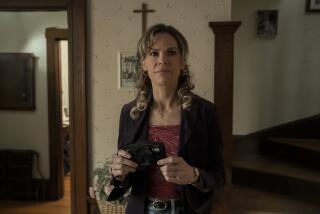The Actorâs Craft: Hilary Swank was born to play real-life roles
Growing up in a mobile home in the Pacific Northwest, Hilary Swank unwittingly found herself placed in her first role: trailer trash.
âMy friendsâ parents didnât want me playing with their kids, and I didnât understand it, because I didnât think of where I lived as being that big of a deal. I had a roof over my head,â Swank said last week as she bit into a cucumber finger sandwich at Santa Monicaâs Tudor House tea room, a world away from her modest childhood home. âBut their parents would say, âYou need to go home now.â At 7 years old, I learned what classism was, growing up poor.â
These days, The Poor Girl has become strongly identified with another character type close to her life story: The Bold, Resilient Woman. Itâs little wonder, considering Swank won two Academy Awards for portraying such characters -- first as a girl struggling with sexual identity crisis in 1999âs âBoys Donât Cry,â and five years later as a boxer in âMillion Dollar Baby.â
Her latest film, âConviction,â out Friday is no exception. She plays Betty Anne Waters, a real-life single mother who put herself through law school in an effort to free her brother from prison because she believed he was wrongly convicted of murder. But instead of rebelling against or despairing over what some might see as pigeonholing, Swank, 36, seems at peace with it. She doesnât care if sheâs typecast, she says, because she likes drama.
âDramatic, yeah. Thatâs how people probably think of me,â she said. âThe hardest thing for an actor is to break out of what they do. I want to do it all -- but at the core of my passion is drama. And I definitely get sent more dramas than anything else. But that doesnât worry me at all, because dramas move me. They inspire me. They broaden my world more than an action film or a scary film or a comedy.â
Swankâs strong dramatic bones seem to show through even when she does attempt something less serious -- like the 2007 romance âP.S. I Love You.â Early in the story, her characterâs fiancĂĆĂâĂâĂâĂĆâĂ⊠dies from a brain tumor.
âI thought I was doing something light, but I ended up crying every day of that movie,â she said, laughing.
Still, repeatedly taking on sober fare can be taxing, Swank admits. She first read the âConvictionâ script after completing âMillion Dollar Baby,â but decided she wasnât ready for it. âI had done so many real-life characters back-to-back, and I just needed to breathe for a moment,â she said.âI play a lot of these true-life stories, one, because thereâs not a lot of original, unique fictional stories,â she said. âIf there are, theyâre usually written for males.â
âConviction,â set in Massachusetts, centers on the bond between Waters and her brother, Kenny (played by Sam Rockwell), who remained close even after they were sent to separate foster homes as children. When a diner waitress was found stabbed to death in her trailer home in 1980, Kenny -- known as a local troublemaker -- was charged with murder, convicted and sentenced to life in prison. Waters, believing he was innocent, devoted the next 18 years to freeing him.
Tony Goldwyn, the director of the film, spent years trying to attain the rights to the story after learning about Waters on a TV news magazine. He and screenwriter Pamela Gray repeatedly visited Waters to interview her, and they dug up court transcripts to piece together the script.
That strength of that story is what ultimately persuaded Swank to sign on to the film, Goldwyn said -- plus, she had come to accept that this was the kind of part she played best.
âShe said to me, âI have realized that I was put on the planet to play a certain kind of characters, and this is one of them. This is what I was meant to do. Itâs to bring to life people like Betty Anne Waters,ââ he recalled.Sitting in the tea room, Swank was dressed casually in a loose-fitting dress, her hair down, sans makeup. A few of her fingernails had chipped, pink nail polish on them. It was this kind of lack of pretension in Swankâs appearance and attitude that made Waters feel comfortable with the actress playing her.
âI saw her in âBoys Donât Cryâ and then âMillion Dollar Baby,â and thereâs something about her -- she didnât come from riches,â said Waters, who lives in Rhode Island. âI think if I had been allowed to pick someone, I would have picked her. I didnât feel like sheâs this big, intimidating Hollywood glamour, rich girl.â
Thatâs how audiences feel about Swank as well, said Nancy Utley, the co-president of Fox Searchlight Pictures, which has released three films starring the actress, including âConviction.â
âI think that Hilary can successfully play many types of roles. However, audiences seem to especially enjoy seeing her in those that mirror her own life story: a woman who works hard against overwhelming odds to achieve a goal,â the executive said.
Thatâs not to say all of Swankâs recent films have been success stories. Searchlight had high awards hopes for her last film, 2009âs âAmelia,â but the Amelia Earhart biopic was critically panned and made just under $20 million at the box office.
âI take the business side to heart,â Swank admitted. âBecause I used to just be, âIâm all about the art.â But itâs a business too. And companies like Fox Searchlight, I think, are brave because they take chances and risks. I want to do good by them, and I want them to know that I appreciate it.â
But sheâs not worried about the commercial prospects for âConviction,â she said, because the movie âwasnât made for a bunch of money.â
âI think $12 million? Thatâs not a lot to recoup,â she said. âIt would be hard, I think, if you had a $100-million movie over your head. As an actor in a movie like that, I might have a hard time breathing.âThough sheâs yet to be in a big-budget franchise film, Swank acknowledges that her career has changed significantly since âtwo-time Academy Award winnerâ was added almost like a title in front of her name.
âI think after âBoys Donât Cry,â it was like I was shot out of a cannon and it was just this little movie that could, that all of a sudden got all of this recognition. At that moment, I thought, âWhere do you go from here?ââ she said. âAnd you just have to get back in touch with why youâre telling stories. And itâs not to win awards, although thatâs an incredible feeling.â In Goldwynâs words, Swank has a âhealthy egoâ about the gold statues.
âShe knows that winning an Academy Award is an acknowledgment of a great piece of work, and itâs a tool to be able to do another piece of work. But it is a big responsibility. Those statues are heavy, figuratively and literally.â
Swank witnessed that power when she returned home to Washington. Those who used to pick on her, she found, had suddenly become her biggest fans.
âAfter my movies came out, I would go back to my hometown and everyone was like, âWe always knew you were so special!ââ she said, a glimmer of sadness appearing on her face. âAnd I was like, âOh, you did? Yeah, you always knew it? You always knew it when you took your kids away and wouldnât let them play with me? Is that when I was special?ââBut her ability to access those painful memories is at the core of Swankâs talent, Goldwyn said.
âOne of the reasons sheâs a great actress is that she grew up under tough circumstances,â he said. âShe didnât have it easy. We were filming one scene in a trailer park, and she said, âThis is very intense for me, being here, because I remember living in a place like this and not knowing if I would ever get out of here.ââ
She credits her mother, Judy, for having enough faith in her to pick up and move to Los Angeles when Hilary was only 15. Her mother went to Samuel French bookstore and bought a book listing talent agencies in Los Angeles, and the two would camp out in phone booths for hours, cold-calling agents.
âThat was the biggest gift my mom gave me, was to believe in myself,â said Swank, who divorced actor Chad Lowe in 2007 and now lives with her boyfriend, talent agent John Campisi, and his 7-year-old son. âShe always said, âYou can do anything you want, Hilary. As long as you work hard enough, and you know itâs not gonna be easy, thereâs nothing you canât accomplish.ââ
These days, her mother has a different plea.
âSheâs always like, âCan you ever just do a movie where you live to see the credits?ââ Swank said, smiling. âIâm like, âMom, I live to see the credits in this one!ââ
More to Read
Only good movies
Get the Indie Focus newsletter, Mark Olsen's weekly guide to the world of cinema.
You may occasionally receive promotional content from the Los Angeles Times.











